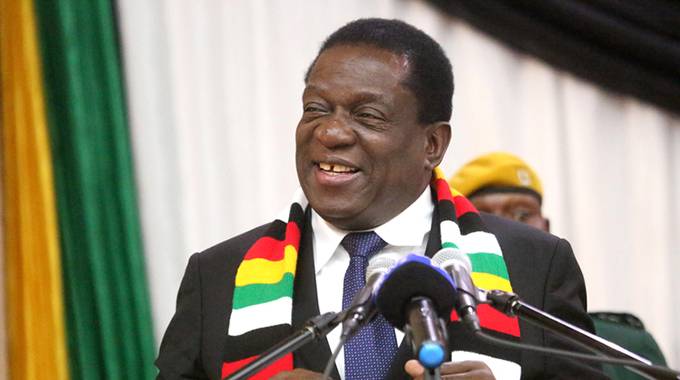EDitorial Comment: Time business spoke against sanctions

We want to commend President Mnangagwa for standing firm on Government’s continued funding of Command Agriculture.
This is not gratuitous; there are solid reasons for this, foremost the fact that food is a national security issue in every country. But there is more.
President Mnangagwa told business leaders at their inaugural meeting on Monday last week that even developed economies, including the European Union bloc, subsidise agriculture for various strategic reasons, but mostly for national food self-sufficiency. National sovereignty cannot be guaranteed when the population is hungry.
But the President’s position raises broader issues and challenges the role and attitude of business itself to the welfare of this country. Many of them are still stuck in negativity about the whole land reform programme launched by Government almost 20 years ago.
They treat it dismissively as a Zanu-PF scheme to win elections. This attitude is unhelpful and must change — really change — not the childish oppositional posturing meant to please those who imposed sanctions on Zimbabwe in order to get funding. Instead we expect business to start talking strongly and with one voice against sanctions rather than adopting party positions. Entrepreneur and Econet founder, Strive Masiyiwa, broke the mould last week, calling for an end to these evil sanctions and that Zimbabwe deserves a chance to chart its economic path unencumbered.
Why are the rest of the businesses quiet? What and how are they benefiting from ZDERA? Why are they seemingly ashamed to speak out against this infernal evil if they are committed to Zimbabwe’s prosperity? Why do they find the word patriotic embarrassing to say in public?
These are not merely rhetorical questions. They go to the heart of our current economic challenges and the austerity measures being introduced by Government.
Business is furious over a two percent transactional tax on electronic transfers above $10 up to $500 000. This is meant to reduce Government debt, but the same businesses are happy to talk about retrenchment in the civil service and for Government to cut spending, including funding of agriculture, which they think is a waste. The reasoning is self-serving and political again.
For a start, Government would not need Command Agriculture if business was playing its patriotic role instead of political games. There are a lot of raw materials from agriculture which business can fund: cotton, maize, sugarcane, soyabeans, tobacco, among others. Government has issued 99-year leases to guarantee investment, but our business people are obsessed with the classical collateral under which they can grab the land if the farmer fails to service the loan.
Already the attitude is bad. It should be part of the loan deal to support the farmer to succeed, not watch him fail. This could be in the form of skilling, extension services, dams and irrigation infrastructure, seed and fertilisers. This is what Rhodesian businesses did to beat sanctions, all anchored on import substitution.
Our own businesses are too oppositional to even appreciate what’s called enlightened self-interest. So when a black entrepreneur like Kudakwashe Tagwirei displays what Israelis call chutzpah to play his patriotic role and Government rewards him, there’s a holy hullabaloo about “State capture”.
So private-public sector partnerships are legitimate only if the private business involved is foreign? And when tomorrow Government engages such a foreigner the complaint is that locals are being ignored or sidelined, or are considered for ancillary roles only! This is by no means to condone or support corrupt deals, but corruption thrives where there are gaps and business is not playing its patriotic role and demanding its full stake in the national economy. Business can’t stand akimbo while the nation grinds to a halt for lack of fuel and then cry “State capture” when somebody steps in to save the situation.
The same businesses were neck-deep in the price madness and withholding of basic commodities last month. There was evident collusion among business cabals manipulating the market yet making noises about free market forces.
When it suits them they want Government to interfere with the same market forces by controlling imports. The narrative must be consistent; it’s time business came to the party.
We want to part by stating that patriotism and nationalism are not old-fashioned concepts. They can sit comfortably with democracy and transparency.









Comments